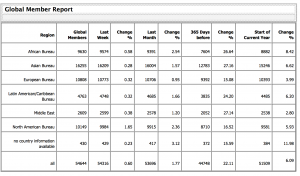ISOC’s development continues apace. Sometimes members can forget to explain what ISOC does and where it operates. The Internet Society is well known as the organisational home of open Internet Standards the IETF . This activity remains a core responsibility.
What is less well known is that ISOC has over the last few years become a major contributor to high-level discussions on Internet governance, digital content, privacy, and many other issues. The Society promotes, influences, and shapes discussions through participation in international fora such as IGF, WIPO, OECD, Council of Europe, the UN WSIS Forum, World Economic Forum and ITU, to name a few.
ISOC as a sector member of ITU participated in the recent WCIT event in Dubai. Members provided guidance and assistance to many countries delegations from around the world. ISOC chapters as local activities managed by ISOC members are increasingly stepping up their policy work in both developing as well as developed countries.
ISOC has always played a significant role in developing Internet access around the world from the earliest days of the Internet and the Society. The Developing Countries workshops taught many of the original trainers of the trainers and engineers who implemented and continue to build Internet connectivity around the world. ISOC members have been prominent contributors and volunteers to Internet governance and management institutions around the IETF, Regional Internet Registries, IANA, ICANN as well as Internet Exchange Points.
This broad engagement by ISOC and its members continues today with regional offices being established by ISOC extending funding, training and programmes to assist in the creation and development of local chapters and projects to guide development of the Internet around the world as a resource for everyone.
For instance, in Africa we are hosting our 4th annual AfPIF (Peering and Interconnection Forum) event this Sept. The Internet Society was selected by the African Union to conduct workshops to support the establishment of Internet Exchange Points (IXPs) as part of the African Internet Exchange System project. Peering and Internet Exchange Points are a fundamental and empowering change to the way communications infrastructure gets deployed in emerging economies.
The Chapter map, shows how widespread the Chapters are; Latin America, West Africa and Asia are all well covered. The Far East Bureau in Singapore established last year is a good example of how the Society is consolidating its presence and activities globally.
There are some 17 Chapters in Asia and 25 in Africa; you will see from the table below that the Asian Bureau in fact has the highest membership, while Africa is very much on a par with Europe and North America in terms of numbers.The growth in membership is strongest in developing regions at between 6% and 8%. This is not an organisation driven from Silicon Valley or Silicon Fen.
As the table shows ISOC membership is also strong in Europe and growing at 4% with around 10,000 members. The local UK England chapter has around 2,400 members or 24% of the European total. The commitment to an open and accessible Internet for everyone is global and growing.
Nevertheless so are the challenges.
Christian
Thanks to Robin Wilton ISOC Identity & Privacy program, The ISOC Public Affairs team, Olivier Crepin-Leblond and others for their contributions to this note.

